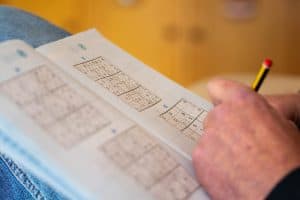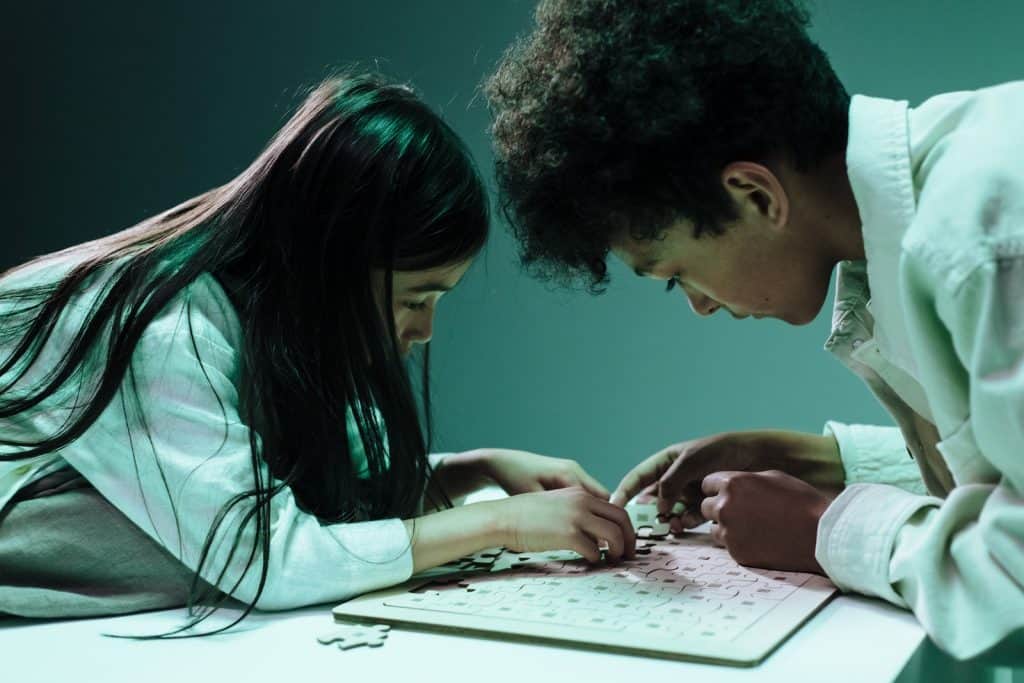“Will Jigsaw Puzzles Keep My Mind Sharp As I Age?” is a question often posed by seniors and their caregivers. The aging population is always seeking ways to keep their minds sharp and active, and jigsaw puzzles are one such method that is gaining traction. But are they genuinely beneficial?
The great news is that playing with jigsaw puzzles go beyond being a rewarding activity and a fun way to spend your time. Jigsaw puzzles can contribute to better cognitive functioning, enhance memory skills, and even help prevent cognitive decline in older adults.
How do Jigsaw Puzzles Test Your Brain?

Completing puzzles involves a host of cognitive skills, ranging from visual perception to logical reasoning. When you’re solving jigsaw puzzles, your brain undergoes a terrific workout. Both sides of the brain are engaged – the logical left brain as it works on sorting pieces, and the creative right brain as it pictures the completed image. This dual stimulation boosts cognitive functions, improves problem-solving skills and hones short-term memory.
Furthermore, puzzles improve hand-eye coordination and visual spatial reasoning too, as your eyes guide your hands to find the appropriate puzzle pieces. Puzzles can help you refine these critical cognitive abilities, which tend to grow weaker with age.
Jigsaw Puzzles and the Aging Brain
The aging brain is susceptible to many problems, such as memory loss and cognitive decline. Alzheimer’s disease is becoming increasingly prevalent among seniors, causing significant impairment of cognitive functioning.
Engaging in jigsaw puzzles good for your brain health. Completing puzzles regularly can help keep the aging brain sharp and active. A study published in the Archives of Neurology found a link between regularly playing puzzles and a reduced risk of developing dementia.
Furthermore, this mentally stimulating activity might serve as a preventative measure against memory-related diseases, showing that seniors jigsaw puzzles are seeing the benefit. The act of finding and placing puzzle pieces stimulates brain cells, promoting healthier brain function and reducing the risks associated with cognitive decline.
Jigsaw puzzles are not just for the aging brain. They’re a timeless form of entertainment and cognitive stimulation for people of all ages. Solve jigsaw puzzles with your grandchildren for some quality bonding time while keeping both your brains active.
Mental Health Benefits of Jigsaw Puzzles

Engaging with jigsaw puzzles can bring more than just cognitive improvement. The challenge of figuring out how each piece fits together can be seen as a beneficial form of stress. This activity propels the problem-solving function of the brain, stimulating critical thinking and focus.
The satisfaction derived from fitting each piece into its precise location can also prove to be immensely calming. Watching a complex image slowly coming together piece by piece can significantly reduce overall stress levels.
It is also important to note that chronic high stress levels are not healthy, as they are a risk factor for several severe conditions. These conditions include heart disease and stroke. Therefore, any activity that helps to mitigate stress is beneficial to overall health.
Another notable benefit of solving puzzles is the sense of accomplishment it provides. Successfully completing a puzzle, especially a complex one, can give one quite a boost in mood and self-esteem.
Incorporating Jigsaw Puzzles into Your Daily Life
Integrating jigsaw puzzles into your routine is a straightforward task. Start with simpler puzzles and gradually move on to more complex puzzles as your problem-solving skills improve.
Aside from solving jigsaw puzzles alone, they can also be a great social interaction tool. Invite friends over for a puzzle party, or set a puzzle out in a common area for everyone to contribute to casually.
While jigsaw puzzles serve as an effective cognitive workout, it’s essential to engage in other activities to maintain brain health. You might enjoy word games like crosswords, word searches, or sudoku puzzles. These not only test your vocabulary and language skills but also provide a great post-dinner or Sunday morning activity.
It’s also vital to maintain physical fitness and activity. Regular physical activity is known to safeguard against cognitive decline, Alzheimer’s disease, and other memory-related conditions.
An imbalance of cholesterol levels, high blood pressure, and excess weight are also risk factors for cognitive decline and dementia. Maintaining a healthy weight and diet, getting enough sleep, and balancing your blood pressure can help mitigate these risks.
Engage in Other Activities for Mental Fitness

Mix up your cognitive exercises to keep them engaging and exciting. It is easy to add variety to your cognitive workout routine. Playing word games can be fun and beneficial at the same time.
Take Sudoku puzzles, crossword puzzles, and word puzzles for example. They engage different cognitive abilities and keep the mind sharp. Engaging in these puzzles might feel like leisure time, but your brain will recognize them as valuable problem-solving exercises.
Consider exploring board games too. Those requiring strategic thinking can be particularly beneficial. Additionally, memory-based card games challenge your mind in different ways, instigating recall and strategy.
Lastly, don’t forget about brain teasers. They are great fun and can keep your mind active and brain sharp. Each brain teaser brings a unique challenge, making every workout different for your brain.
Staying Healthy Physically and Mentally
Alongside engaging in brain exercises, consider becoming active physically to bring your “keeping the brain sharp” game to a whole new level. Physical activity improves blood flow, lowers blood pressure, and aids in maintaining a healthy weight. All of these bodily changes positively impact brain health, and in turn, aid in preventing cognitive decline and memory loss, common in older adults.
Furthermore, studies show that eating a healthy, balanced diet can help keep cholesterol levels in check and reduce the risk of Alzheimer’s disease. Living a healthy lifestyle—managing stress levels, keeping blood pressure and cholesterol levels at healthy numbers, getting enough sleep, and maintaining a healthy weight, will contribute significantly to keeping your brain active and mind sharp.
Role of a Balanced Diet in Maintaining Brain Health
Maintaining a balanced diet plays a crucial role in preserving brain health. Studies have shown that eating a healthy diet helps to maintain cholesterol levels. This habit can be particularly beneficial in reducing the risk of cognitive decline and Alzheimer’s disease.
Ensuring a balance in diet is another essential aspect. Eating a variety of nutrient-rich foods can provide all the necessary vitamins and minerals that our brain requires to function effectively.
Another important factor in maintaining brain health is managing stress. Chronic stress can have a detrimental effect on our brain, affecting memory and learning capabilities. Implementing stress-management strategies such as relaxation exercises, mindfulness, and yoga can be particularly beneficial.
Maintaining healthy blood pressure and cholesterol levels are also vital to keeping the brain active and sharp. High blood pressure and cholesterol levels can impair blood flow to the brain, affecting its functioning.
Lastly, sleeping adequately and maintaining a healthy weight are significant factors in preserving brain health. A good night’s sleep is essential for memory consolidation, while a healthy weight can reduce the risk of diseases that affect the brain.
Exploring Different Types of Puzzles

While this piece mainly focuses on jigsaw puzzles, it’s important to note there are numerous other varieties of puzzles that can provide similar cognitive benefits.
Examples include 3D puzzles, tangram puzzles, Sudoku, and word puzzles. Each of these offers unique challenges and engages different cognitive skills, ensuring a diverse brain workout.
Other types, like optical illusion puzzles, provide a different kind of mental stimulation, testing our perception and spatial reasoning capabilities. Ultimately, the variety of puzzle types available ensures a well-rounded cognitive exercise that keeps our minds sharp and engaged.
The Advantages of Technology in Puzzle Solving
Embracing technology can also enhance the fun and benefits of puzzle-solving. Today, digital puzzles have become readily available through various websites and mobile applications. These can be conveniently solved on smartphones or computers.
These technological platforms provide a wide array of puzzle options to pick from. Moreover, they also allow users to adjust the difficulty level according to their comfort. This customization ensures that users are constantly challenged but not overwhelmed.
Furthermore, a standout feature of digital puzzles is their convenience when it comes to portability and compatibility. No matter where you are or how much time you have, you can squeeze in some brain exercise. This essentially means that you can take your puzzle-solving activities with you anywhere, whether you’re traveling or just have a few spare moments at home. This utilization and advancement of technology in puzzle-solving ensures an accessible and consistent brain workout.
The Role of Puzzles in Enhancing Social Skills
Puzzles are not only beneficial for their mental health benefits but they also play a pivotal role in enhancing social skills. This is especially true when puzzles are solved in groups. Collaborative puzzle-solving enables seniors to foster better communication and build team-working abilities.
They can also provide opportunities for seniors to appreciate different perspectives. This enhances their empathy and understanding towards others, which is crucial within a group setting.
Lastly, these social advantages of group puzzle-solving can be a powerful tool to help reduce the feeling of isolation. This is especially beneficial for older individuals, who may often experience feelings of loneliness. Group puzzle-solving offers a captivating activity that can help open up opportunities for social interaction.
The Balance Between Mental and Physical Exercise
While engaging in mental exercises like puzzles is undoubtedly beneficial for preserving cognitive function, it’s equally pivotal to keep in mind that physical health and mental health are closely intertwined.
One of the reasons for this correlation lies in the effect of regular physical exercise on cardiovascular health. Improving heart health has a positive knock-on effect on our brain function. This is mainly because heart health directly concerns the body’s circulatory system, allowing for increased blood flow to the brain.
Incorporating simple, low-intensity exercises such as walking, yoga, or gentle aerobics into your daily regimen can significantly aid in supporting your overall cognitive health. Collectively, these activities provide a holistic approach to enhancing and preserving mental acuity as we age.
Final Thoughts – Will Jigsaw Puzzles Keep My Mind Sharp as I Age?
In essence, will jigsaw puzzles keep my mind sharp as I age? Undoubtedly, yes. While jigsaw puzzles offer an enjoyable and relaxing activity, they also provide a workout for your cognitive skills, maintain brain health, and slow down cognitive decline.
Seniors who regularly enjoy jigsaw puzzles will likely see these benefits, but they should also engage in other activities that include physical activity, social interaction, and a generally healthy lifestyle. Regular check-ups to monitor risk factors, such as high blood pressure and cholesterol levels, are also essential.
Remember, the goal isn’t just to keep your brain sharp but also to enjoy the process of doing so. Find puzzles that interest you, play word games, or engage in other brain exercises that you find interesting and exciting. Your mental health benefits from not just the workout your brain gets but also from the fulfilment you derive from these activities.
So bring out your jigsaw puzzle, enjoy the challenge, and be rest assured your brain will thank you too!

